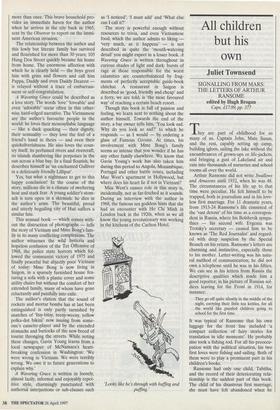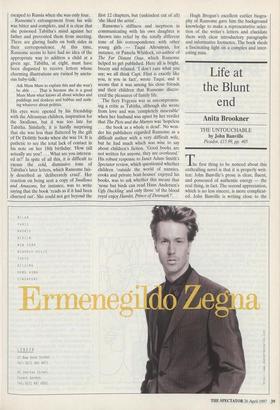All children but his own
Juliet Townsend
SIGNALLING FROM MARS: THE LETTERS OF ARTHUR RANSOME edited by Hugh Brogan Cape, £17.99, pp. 377 They are part of childhood for so many of us. Captain John, Mate Susan, and the rest, capably setting up camp, building igloos, sailing the lake without the encumbrances of grown-ups or life-jackets, and bringing a gust of Lakeland air and rain into thousands of nurseries and school rooms all over the world.
Arthur Ransome did not write Swallows and Amazons until 1932, when he was 48. The circumstances of his life up to that time were peculiar. He felt himself to be trapped, both in journalism and in his love- less first marriage. For 11 dramatic years, from 1913-24 Ransome's life consisted of the 'vast detour' of his time as a correspon- dent in Russia, where his Bolshevik sympa- thies — his second wife Evgenia was Trotsky's secretary — caused him to be known as 'The Red Journalist' and regard- ed with deep suspicion by the Special Branch on his return. Ransome's letters are charming and instinctive, especially those to his mother. Letter-writing was his natu- ral method of communication; he did not own a telephone until he was in his fifties. We can see in his letters from Russia the descriptive qualities which made him a good reporter; in his picture of Russian sol- diers leaving for the Front in 1914, for instance:
They go off quite silently in the middle of the night, carrying their little tea kettles, for all the world like puzzled children going to school for the first time.
It was typical of Ransome that his own luggage for the front line included 'a compact collection of fairy stories for translation in idle moments'. He probably also took a fishing rod. For all his preoccu- pation with the political situation, his two first loves were fishing and sailing. Both of them were to play a prominent part in his children's books.
Ransome had only one child, Tabitha, and the record of their deteriorating rela- tionship is the saddest part of this book. The child of his disastrous first marriage, she must have felt abandoned when he escaped to Russia when she was only four.
Ransome's estrangement from his wife was bitter and complete, and it is clear that she poisoned Tabitha's mind against her father and prevented them from meeting. There are glaring faults on both sides in their correspondence. At this time, Ransome seems to have had no idea of the appropriate way to address a child at a given age. Tabitha, at eight, must have been disgusted to receive letters whose charming illustrations are ruined by unctu- ous baby-talk:
Ask Mum Mum to explain this and she won't be able . . . That is because she is a good Mum Mum what knows all about witches and puddings and donkeys and babbas and noth- ing whatever about politics.
His eyes were opened by his friendship with the Altounyan children, inspiration for the Swallows, but it was too late for Tabitha. Similarly, it is hardly surprising that she was less than flattered by the gift of Dr Dolittle books when she was 14. It is pathetic to see the total lack of contact in his note on her 18th birthday: 'How tall actually are you? . . . What are you interest- ed in?' In spite of all this, it is difficult to excuse the cold, dismissive tone of Tabitha's later letters, which Ransome fair- ly described as 'deliberately cruel'. Her reaction on being sent a copy of Swallows and Amazons, for instance, was to write saying that the book 'reads as if it had been churned out'. She could not get beyond the first 12 chapters, but (unkindest cut of all) `she liked the artist'.
Ransome's stiffness and ineptness in communicating with his own daughter is thrown into relief by the totally different tone of his correspondence with other young girls — Taqui Altounyan, for instance, or Pamela Whitlock, co-author of The Far Distant Oxus, which Ransome helped to get published. Here all is bright, breezy and relaxed. 'I don't care what you say; we all think Capt. Flint is exactly like you, is you in fact', wrote Taqui, and it seems that it was among his close friends and their children that Ransome discov- ered the pleasures of family life.
The fiery Evgenia was as uncompromis- ing a critic as Tabitha, although she wrote from love and was 'completely miserable' when her husband was upset by her verdict that The Picts and the Martyrs was 'hopeless . . . the book as a whole is dead'. No won- der his publishers regarded Ransome as a difficult author with a very difficult wife, but he had much which was wise to say about children's fiction. 'Good books are not written for anyone, they are overheard.' His robust response to Janet Adam Smith's Spectator review, which questioned whether children 'outside the world of nannies, cooks and private boat-houses' enjoyed his books, was to ask whether this meant that `none but birds can read Hans Andersen's Ugly Duckling' and only those 'of the blood royal enjoy Hamlet, Prince of Denmark?'. Hugh Brogan's excellent earlier biogra- phy of Ransome gave him the background knowledge to make a representative selec- tion of the writer's letters and elucidate them with clear introductory paragraphs and informative footnotes. The book sheds a fascinating light on a complex and inter- esting man.



































































 Previous page
Previous page